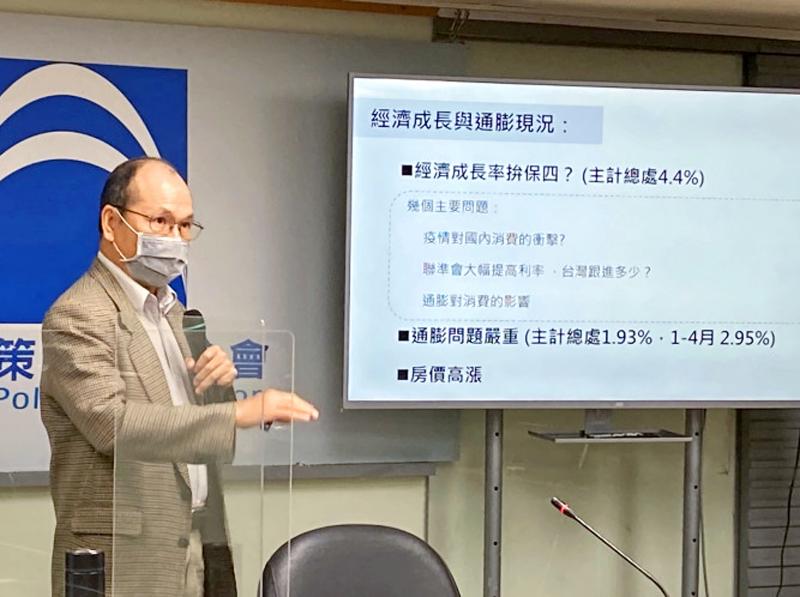Inflation could cause Taiwan’s GDP growth to drop below 4 percent this year, or 0.4 percentage points than the government’s forecast, the Chinese Nationalist Party (KMT)-aligned National Policy Foundation said yesterday.
The party-affiliated think tank made the comment at a news conference that highlighted inflation and energy issues on the sixth anniversary of President Tsai Ing-wen’s (蔡英文) administration.
Lin Chu-chia (林祖嘉), the think tank’s economic and fiscal policy convener, said that the COVID-19 pandemic, the central bank’s interest rate hike and inflation would likely have a cooling effect on economic growth.

Photo courtesy of the National Policy Foundation
The consumer price index last month showed a year-on-year increase of 3.38 percent, while greater price increases were reported for some essential goods, he said.
The price of eggs soared 24.39 percent and the cost of restaurant meals increased 5.56 percent, he said, citing two examples.
The Tsai administration’s policy to eliminate nuclear energy by 2025 was not accompanied by a corresponding increase in renewable energy, which reported sluggish growth over the past five years, he said.
This has resulted in an unstable energy supply along with increased reliance on coal-fired power plants, which has triggered more frequent and longer power outages, he said.
Citing a poll the think tank released on Friday last week, Lin said that 62 percent of Taiwanese disapproved of Tsai’s handling of the economy, 60.6 percent said that large-scale blackouts would occur in the next two years and 53.8 percent said that the energy supply was unstable.
“The Democratic Progressive Party’s government’s [green energy] obsession is getting in the way of Taiwan’s economy and public health,” KMT Legislator Wu I-ding (吳怡玎) said.
The government did not have a clear path to a net zero emissions goal, despite the creation of programs the would cost an estimated NT$900 billion (US$30.35 billion) by 2030, she said.
Regarding the Environmental Protection Administration’s carbon tax scheme, Wu said that the tax rates were too low to have an effect on emissions, and that officials have erred in exempting the power generation sector from the tax.
The government should have worked on developing clean energy alternatives instead of shifting costs to energy consumers such as manufacturers and households, she said.
Additionally, the Tsai administration’s investment in solar energy and energy storage technologies has not led to results that are commensurate to costs, Wu said.
Taiwanese wages declined by 0.004 percent last year, and real wages have been stagnant since 2002, KMT Legislator Hsieh Yi-fong (謝衣鳳) said, citing Executive Yuan data.
The central bank’s decision to raise interest rates — coinciding with the shortening of mortgage payment periods from 40 years to 20 years — has significantly increased economic pressure on young people, she said.
The government’s rent subsidies also misfired, as officials failed to anticipate that the benefits would be claimed by landlords illegally subletting property and not by tenants, as intended, she said.
Additional reporting by CNA

‘DENIAL DEFENSE’: The US would increase its military presence with uncrewed ships, and submarines, while boosting defense in the Indo-Pacific, a Pete Hegseth memo said The US is reorienting its military strategy to focus primarily on deterring a potential Chinese invasion of Taiwan, a memo signed by US Secretary of Defense Pete Hegseth showed. The memo also called on Taiwan to increase its defense spending. The document, known as the “Interim National Defense Strategic Guidance,” was distributed this month and detailed the national defense plans of US President Donald Trump’s administration, an article in the Washington Post said on Saturday. It outlines how the US can prepare for a potential war with China and defend itself from threats in the “near abroad,” including Greenland and the Panama

The Chinese Nationalist Party (KMT) is maintaining close ties with Beijing, the Democratic Progressive Party (DPP) said yesterday, hours after a new round of Chinese military drills in the Taiwan Strait began. Political parties in a democracy have a responsibility to be loyal to the nation and defend its sovereignty, DPP spokesman Justin Wu (吳崢) told a news conference in Taipei. His comments came hours after Beijing announced via Chinese state media that the Chinese People’s Liberation Army’s Eastern Theater Command was holding large-scale drills simulating a multi-pronged attack on Taiwan. Contrary to the KMT’s claims that it is staunchly anti-communist, KMT Deputy

RESPONSE: The government would investigate incidents of Taiwanese entertainers in China promoting CCP propaganda online in contravention of the law, the source said Taiwanese entertainers living in China who are found to have contravened cross-strait regulations or collaborated with the Chinese Communist Party (CCP) could be subject to fines, a source said on Sunday. Several Taiwanese entertainers have posted on the social media platform Sina Weibo saying that Taiwan “must be returned” to China, and sharing news articles from Chinese state media. In response, the Mainland Affairs Council (MAC) has asked the Ministry of Culture to investigate whether the entertainers had contravened any laws, and asked for them to be questioned upon their return to Taiwan, an official familiar with the matter said. To curb repeated

Myanmar has turned down an offer of assistance from Taiwanese search-and-rescue teams after a magnitude 7.7 earthquake struck the nation on Friday last week, saying other international aid is sufficient, the National Fire Agency said yesterday. More than 1,700 have been killed and 3,400 injured in the quake that struck near the central Myanmar city of Mandalay early on Friday afternoon, followed minutes later by a magnitude 6.7 aftershock. Worldwide, 13 international search-and-rescue teams have been deployed, with another 13 teams mobilizing, the agency said. Taiwan’s search-and-rescue teams were on standby, but have since been told to stand down, as